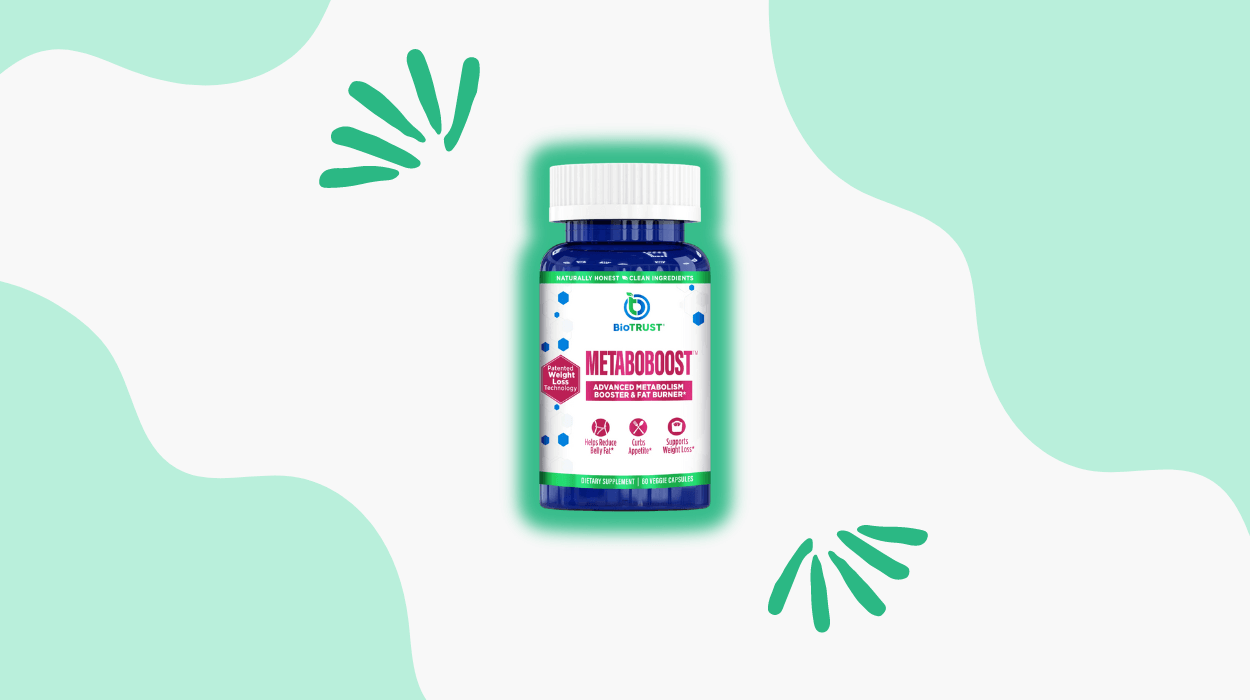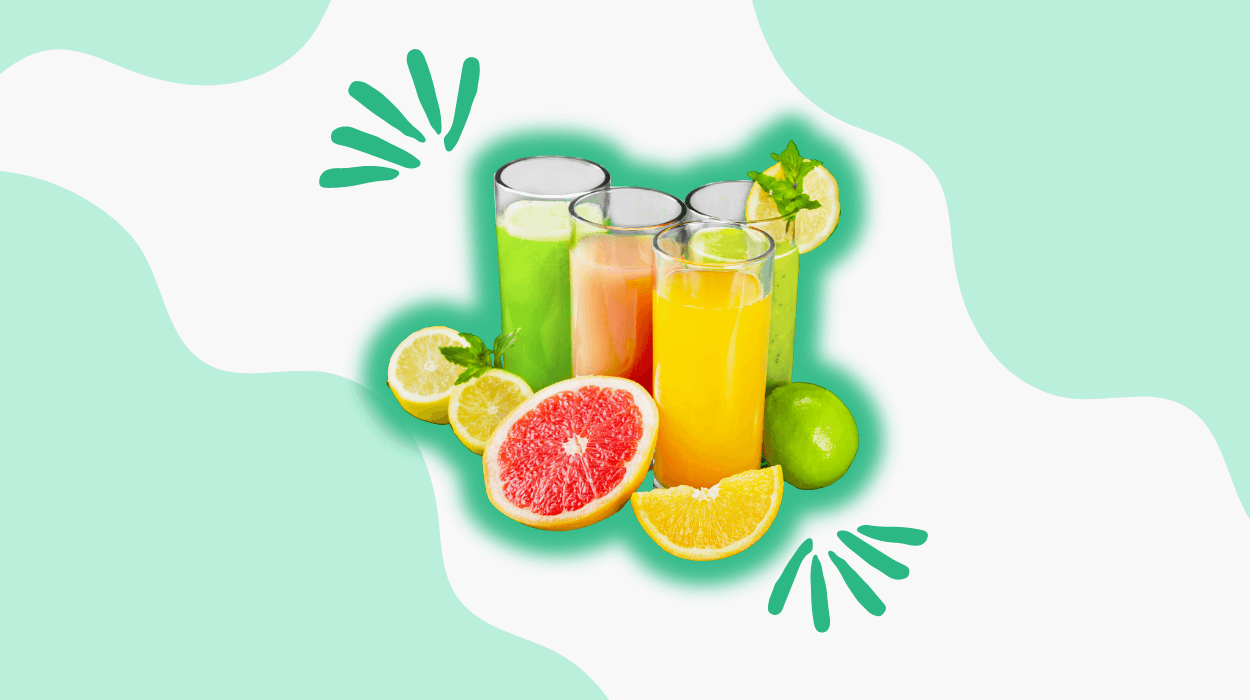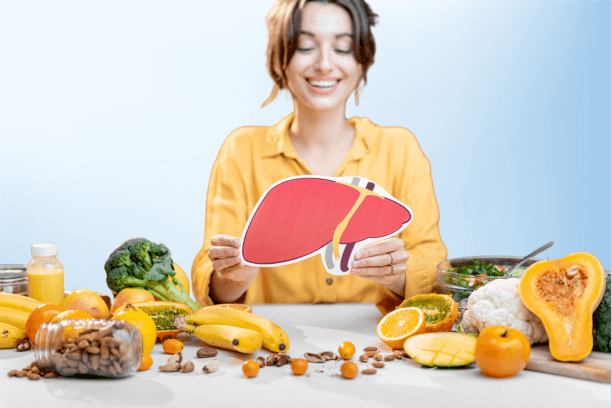

The liver regulates the body’s detoxification processes by helping flush out toxins and maintaining optimal bodily functions. Carrying out a liver cleanse or liver detox diet is believed to aid these detoxification pathways.
A liver cleanse diet may involve cutting out toxic foods from your diet, such as hydrogenated oils and refined sugar. These unhealthy foods are substituted with fresh fruits, vegetables, nuts, and homemade snacks.
Consuming potassium-rich foods, refraining from processed foods, and drinking vegetable juices are some dietary approaches that could align with a liver cleansing program. However, liver cleanses lack scientific evidence and are not regulated by the FDA.
This article will decode some myths surrounding liver cleanse and give you a complete understanding of what a liver cleanse diet entails.

No evidence supports that liver cleanses protect against liver disease. There are over 100 variants of liver disease, including hepatitis A, B, and C, alcoholic and non-alcoholic liver disease.
Focusing on lifestyle changes rather than relying on liver cleanses may help protect against liver disease. Limiting alcohol intake and getting vaccinated against hepatitis B and C may help you shield against liver disease.
Besides, choosing medications carefully, maintaining a moderate weight, and minimizing toxin exposure might help protect against liver disease.
Many people claim to lose weight after a liver cleanse, but this weight loss may be primarily due to fluid loss, not fat loss. Once people resume their regular eating habits, they often regain the weight quickly.
In fact, certain types of liver cleansing diets may decrease the body’s metabolic rate, possibly delaying your weight loss efforts.
Focusing on factors like total calorie intake, diet quality, activity levels, and lifestyle habits could aid in managing body weight. Relying solely on liver cleanses may not be a sustainable or evidence-based approach to controlling body weight.
Contrary to popular belief, no evidence aligns with the claim that liver cleanses could treat existing liver damage.
It is essential to understand that the liver has the ability to regenerate damaged tissue, but this process takes time. Continued liver damage from factors like excessive alcohol intake, poor diet, or drug usage may prevent regeneration and lead to irreversible scarring, known as cirrhosis.
Liver cleanses are believed to detoxify the liver and improve overall health, but they might be unnecessary and lack scientific evidence to support their effectiveness.
Despite their popularity, most liver cleansing products and herbal formulations have not been tested in clinical trials and are not FDA-regulated. This signifies a lack of proof that liver cleanses work at all, and they may cause harm to your system.
The liver detox drink is a refreshing blend of cranberry juice, citrus fruits, and spices that may support your body’s detoxification process.
Here’s how to make a liver detox drink:
Here are some vital components of the best liver cleanse diet:
| Key Components of the Best Liver Cleanse Diet | Examples of Foods to Include | Foods to Avoid |
|---|---|---|
|
High in Antioxidants |
Berries, leafy greens, citrus fruits |
Processed foods, sugary drinks |
|
Rich in Fiber |
Whole grains, legumes, fruits, vegetables |
Refined grains, processed snacks |
|
Good Sources of Healthy Fats |
Avocados, nuts, seeds, olive oil |
Trans fats, fried foods |
Processed foods, like refined sugar, hydrogenated oils, convenience foods, or lunch meats, may harm your liver’s health. Therefore, it is essential to replace these toxic foods with liver-friendly substitutes.
Hydrogenated oils, called “trans fats,” have higher saturated fat concentrations and may raise the risk of non-alcoholic fatty liver and heart disease. These oils are chemically altered to increase shelf life but harm the immune system and cause liver inflammation.
Convenience foods, fast foods, and lunch meats often contain added nitrites and nitrates, which are used as preservatives. These chemicals may induce unhealthy inflammation and negatively impact liver health.
Instead of processed snacks, opt for fresh fruit, nuts, carrot sticks, and homemade granola bars. You can also roast your own organic turkey and chicken breast to replace deli meats for quick lunches and snacks.
Liver support supplements may be a beneficial addition to a liver cleanse regimen. One such supplement is milk thistle, which contains a bioactive compound called silymarin. The compound could strengthen the cell walls in the liver and support healthy regeneration.
Milk thistle could eliminate the buildup of heavy metals, environmental pollutants, prescription medications, and alcohol in the liver. Such mechanisms may aid liver detoxification and improve liver health parameters. It could be taken as a supplement or as a liver-cleansing detox tea.
Dandelion root is another liver support formulation that may aid in detoxification. It has a natural diuretic effect, allowing the liver to eliminate toxins more efficiently. It may also strengthen the immune system, balance blood sugar levels, and soothe digestive upset.
Turmeric contains the bioactive ingredient curcumin, which supports healthy liver tissue and liver metabolism.
However, consult a doctor before integrating liver support supplements into a liver cleanse regimen to understand potential risks and benefits.
Coffee enemas involve injecting room-temperature coffee into the rectum. Many believe coffee enemas may aid liver detoxification, reduce fatigue, and subside constipation. However, there is little evidence to support its usage for such purposes.
During a coffee enema, organic coffee is retained in the bowel, allowing the fluid to enter the liver through the intestinal wall. Coffee beans contain the cafestol compound, and the proponents claim that this compound may stimulate bile flow and enhance glutathione production.
However, some researchers found that coffee enemas may not significantly change glutathione production. This may raise concerns about the potential efficacy of coffee enemas in aiding liver detoxification.
Liver tablets, made from the nutrient-rich liver of young, grass-fed cattle or chicken liver, might be a beneficial addition to a liver cleanse regimen. These tablets provide a concentrated source of folic acid, vitamins A and B, choline, iron, zinc, chromium, and CoQ10. Such a profile makes them suitable for those looking to support their liver health.
When considering liver tablets as part of a liver cleanse, you may opt for capsules that guarantee no usage of hormones, pesticides, or antibiotics in their formulation.
Vegetables that are ideal for liver cleansing include cauliflower, cabbage, and Brussels sprouts. These could be combined with carrots, cucumber, beets, and greens. Such vegetables may help reduce acid levels in the body, promoting a more friendly pH balance.
The high fiber content in raw vegetable juice supports a healthy digestive tract, helping to eliminate toxins from the body more efficiently.
Fresh, organic carrots are essential for any liver cleanse. Carrots are converted into vitamin A in the liver, which helps flush out toxins and reduce fat accumulation. Adding ginger root to the juice may soothe the digestive tract, reduce intestinal gas, and provide anti-inflammatory benefits.
A deficiency in serum potassium levels or a low dietary potassium intake may increase the likelihood of developing non-alcoholic fatty liver disease. Therefore, consuming a potassium-rich diet with foods like leafy greens, bok choy, beets, and broccoli is essential.
A single medium sweet potato (100g serving) contains 337 mg of potassium and high fiber and beta-carotene content. The sugars in sweet potatoes are slowly released into the bloodstream through the liver, preventing spikes in blood sugar levels.
Beetroot and spinach are other potassium-rich foods you may include in your diet. These veggies are antioxidant-rich, help cleanse the gallbladder, and may also improve bile flow.
Beans, like white beans, kidney beans, and lima beans, are potassium-rich sources that provide protein and fiber. Tomato sauces, purees, and pastes are also good sources of potassium.
Bananas are a great addition to a liver-cleanse diet. One medium-sized banana contains 422 mg of potassium. It may aid digestion and help release toxins and heavy metals from the body, which is essential during a liver cleanse.
While on your liver detox, refrain from eating processed food and add free-range organic meats. Try to eat a moderate amount of gluten and refined carbs, as it may help support liver detox.
A 24-hour liver detox diet plan may include consuming liver detox foods like:
Liver cleanses are not necessary for maintaining liver health. No scientific evidence supports their effectiveness, and some cleanses might even cause harm to the liver.
There is no scientific backing about liver cleanses directly aiding weight loss. Focusing on factors like calorie intake, output, and diet quality may support healthy weight management.
Periodically implementing a liver cleanse diet for 24 hours might aid healthy liver detoxification. Overdoing it may prove counterintuitive and do more harm than good.
Prolonged adherence to a liver-cleansing diet may lead to irritability, weakness, compromised immunity, and even kidney damage. Therefore, consult a doctor/certified nutritionist for tailored liver detox diet plans to avoid the risks of such health complications.
A healthy liver is essential for sustaining various bodily functions, including detoxification. A liver cleanse might aid detoxification but may not protect against liver diseases.
Limiting processed foods, abstaining from alcoholic beverages, and following a liver-friendly, potassium-rich diet are natural ways to support optimal liver health.
Other measures like taking liver supplements and coffee enemas are believed to aid liver detoxification.
However, a lack of conclusive evidence and regulation by the FDA may raise concerns about the efficacy of these methods.
Tyler Read earned an undergraduate academic degree from Sonoma State University, California and is a certified personal trainer (CPT) with NASM (National Academy of Sports Medicine). With over 16 years of experience, Tyler has trained clients both online and in-person.
He is passionate about helping others turn their love for fitness into a career. Tyler has worked with many local and commercial gyms before establishing his successful private personal training business, which he continues to operate.
